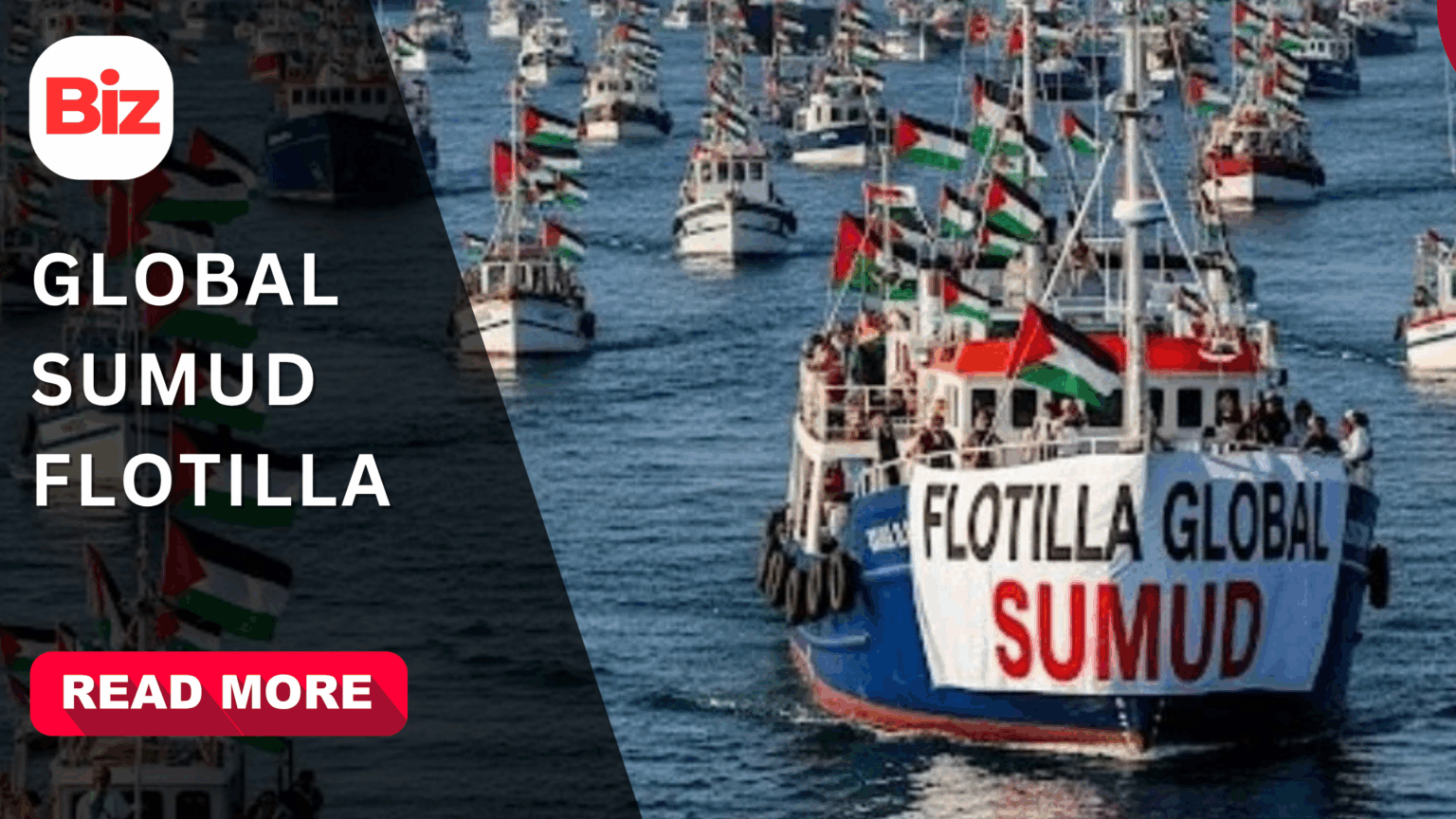Once again at the end of September and on the first days of October 2025 the maritime focus of attention shifted to the eastern Mediterranean when the Global Sumud Flotilla, a large international fleet of small ships and yachts, attempted to sail to Gaza to break the naval blockade of Israel and deliver token humanitarian supplies. The operation, which the organisers described as a humanitarian corridor led by people, concluded with the interception of most of the vessels by the Israeli navy during international waters and dozens of activists arrested an event that once again sparked considerable discussions of the legality of the blockade, protest means and humanitarian intervention politics.
What is Global Sumud Flotilla?
The name of the coalition of civil-society organisations, comprising the Freedom Flotilla Coalition, Global Movement to Gaza, Maghreb Sumud Flotilla and Sumud Nusantara, who organised the 2025 attempt was dubbed in Arabic as sumud (steadfastness). The flotilla has gathered tens of boats and boasted thousands of registered attendees in all parts of Europe, Asia, Africa and the Americas; organisers claimed that the goal was symbolic as much as practical, to lift what they claim to be an illegal siege, to publicize the humanitarian crisis in Gaza, and to bring some maritime aid to it.
The journey and the capturing.
In late September and early August, ships set out of the ports of the Mediterranean, and joined each other on their way to Gaza. The Israeli navy did so on 1-2 October 2025, when the flotilla was approximately 100-140 nautical miles off the coast of Gaza. Thousands of Israeli troops boarded several of the ships, fired water cannon and other forms of non-lethal force, and arrested dozens of protesters who were subsequently deported through Israeli ports, according to several news organizations. Some among them featured in the news onboard included high-profile public figures, such as climate activist Greta Thunberg and former Barcelona mayor Ada Colau, which made global news. Organizers complained of harassment (including threats of communications jamming and a suspected drone strike against a lead vessel in September), with Israel claiming that the measures were necessary to enforce its blockade and avert a provocation.
The human and legal points of contact.
The controversy is dominated by two issues that cannot be separated: the intent of humanitarianism and the intent of political provocation.
Organizers stressed that the flotilla was supplying food, medical supplies and civilian activists with the aim of non-violent protest; many members of the flotilla noted that the aid was mostly symbolic and aimed at getting the world to pay attention to the humanitarian disaster in Gaza. Those who endorse this claim believe that blocking of civilian sea convoys that could deliver aid could be a justifiable avenue of peaceful civil resistance.
Israel and supporters packaged the mission as an intentional provocation, which might jeopardize civilians and bolster the Hamas political narrative. Israel continues a naval blockade of Gaza, which it claims is essential due to security reasons, which have been challenged by critics and certain UN organizations on several occasions as being disproportionate or unlawful, especially when it limits the transport of nourishing items to civilians. The case of the 2010 Mavi Marmara incident, when Israelis raided a Turkish-led flotilla and killed 10 activists, is the historical point of departure of both parties and a reminder of how fast such operations may go wrong.
Diplomatic and international reactions.
The interception generated rapid polarizing international reactions. Other states and civil-society organizations were critical of what Israel had done and called to release jailed activists; others warned actors against going to an exclusion zone and called to de-escalate. Certain governments (especially Turkey and many countries in the Global South) condemned the seizures bitterly. Protests were reported in capitals in Rome down to Istanbul by Reuters and AP and diplomatic interference in the form of expulsions and official denunciations by a number of states. Simultaneously, governments of some European countries expressed a concern regarding their own nationals participating in what they regarded as a dangerous political gimmick.
The reason the flotilla is important.
Although the amount of supplies transported by the flotilla might be quite insignificant, its symbolism and political impact are mostly negative:
- Narrative leverage: High-profile individuals and live-streaming options were a guarantee of coverage by international media, moving humanitarian issues in Gaza to higher places on the agenda, and putting them on the first pages of newspapers and social media feeds.
- Legal focus: The case has given a fresh legal exploration on whether maritime blockades are legal, whether neutral vessels should have the right to transit the international waters and the role of states in the protection of civilians during blockades.
- Domestic politics: The flotilla has caused protests, parliamentary inquiries and diplomatic tense relations in the countries in which it is taking part, demonstrating how transnational activism can be used to influence bilateral relations.
Perils and reproaches–on both sides.
Critics of the flotilla cite the deliberate sailing into a conflict area, especially during periods of increased conflict, as a possible way of making the conflict harder, putting lives at risk, and being used by armed groups to propagate messages. Governments that are pro-flotilla argue that the true danger lies with Palestinian civilians who are confined in Gaza with very minimal access to basic services and goods. Law The jurists are at a crossroads: humanitarian motives are explainable, but international law concerning blockades, belligerent rights and neutral passage is complicated and fact-based; the decision of the court is not unquestionable.
What to watch next
Among the issues to watch in the next few days and weeks are: what will be done with arrested activists (deportation dates, criminal charges); the reaction of the international community (expulsions, protests, additional sanctions or boycotts); and whether any new investigations will be conducted on the alleged harassment, drone attacks against flotilla vessels, or maritime interdiction. The political reverberation was experienced in the parliaments, courts, and the streets in the various continents.
Conclusion
The Global Sumud Flotilla did not merely consist of pallets of aid, or technical capacity to approach the shore of Gaza. It was an intentional political gesture aimed at lending some human face to a long-smoldering crisis, pushing blockade law to the limit, and compelling governments to declare something publicly. Depending on whether the mission is regarded as brave civil disobedience or a reckless provocation, intercepting it has rekindled vital discussions on the law of the sea, on humanitarian intervention and the manner in which international civil society tries to define the conflicts of today. The headlines of the moment might die but the legal, diplomatic and moral issues that the flotilla brought to the fore are most likely to echo across months to come.








